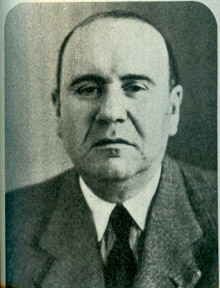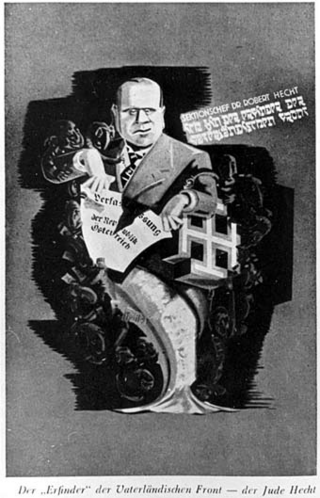Sektionschef Dr. Robert Hecht

Personalia
Born:
Died:
Profession:
Persecution:
Imprisonment 12.03.1938 - 02.04.1938,
Dachau concentration camp 02.04.1938 - 30.05.1938,
Driven to his death on 30.05.1938
KZ Number:
Honors:
Grand Decoration of Honor with the Star for Services to the Republic of Austria
Grand Decoration of Honor for Services to the Republic of Austria
Curriculum Vitae
After this, he became a legal trainee at the district court in Vienna-Leopoldstadt and then moved to Bad Ischl as a judge. In 1914, he went into the First World War as a lieutenant, but was soon transferred to military jurisdiction. In November 1919, he disarmed as a captain-auditor in the War Ministry. However, he continued to work at the ministry, heading the legal office from 1923 and advancing to section chief in 1925. He is an advisor to the long-serving Minister of the Army Carl Vaugoin. From 1932, he also advised Federal Chancellor Engelbert Dollfuß. It is ultimately Robert Hecht who recommends using the War Economy Enabling Act (KWEG) from 1917 to prosecute those responsible for the collapse of the Credit Institute. This law was subsequently used to establish the authoritarian corporative state and the chancellor dictatorship under Engelbert Dollfuß and Kurt von Schuschnigg. Hecht also worked on the 1934 constitution, the Federal Law on the Patriotic Front and the Federal Compulsory Service Act. In 1934, he finally converted to the Catholic faith.
In 1936, he was appointed head of the Postal Savings Bank Office. The National Socialists used Robert Hecht's Jewish ancestry to launch campaigns against the Ständestaat and the Vaterländische Front.
Immediately after the German troops marched in, Hecht was arrested on 12 March 1938. Hecht was arrested on March 12, 1938 and deported to the Dachau concentration camp

Citations
- Dokumentationsarchiv des österreichischen Widerstands (DÖW)
Austria Forum: Robert Hecht
Wikipedia unter de.wikipedia.org/wiki/Robert_Hecht
